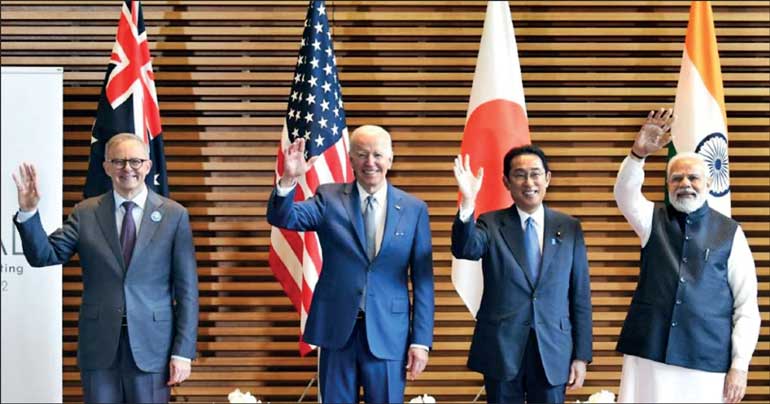Saturday Feb 21, 2026
Saturday Feb 21, 2026
Friday, 10 May 2024 00:24 - - {{hitsCtrl.values.hits}}

The aim of these states is to partner with Sri Lanka and create a positive opinion in the eyes of the people and those in governance as they continue their tug-of-war with China
 In the lead up to Sri Lanka’s Presidential election in October 2024, there have been numerous visits by foreign governments to create a good rapport with the various candidates. Visits by great powers to Sri Lanka appear to be a tradition before a national election or during global calamities. My analyses over the years indicate an increase in the frequency of interactions and their breadth during the visits.
In the lead up to Sri Lanka’s Presidential election in October 2024, there have been numerous visits by foreign governments to create a good rapport with the various candidates. Visits by great powers to Sri Lanka appear to be a tradition before a national election or during global calamities. My analyses over the years indicate an increase in the frequency of interactions and their breadth during the visits.
In order to ascertain this tug-of-war, this article is divided into three sections: first, the QUAD visits; second, the Chinese engagements, and third Sri Lanka’s future in the Indian Ocean.
The QUAD visits
Visits by high-level delegations from member states of the Quadrilateral Security Dialogue (QUAD), Australia, India, Japan and the United States, are clearly visible in ensuring that they create a positive image in the country and with the political factions. The aim of these states is to partner with Sri Lanka and create a positive opinion in the eyes of the people and those in governance as they continue their tug-of-war with China. Sri Lanka will continue to be a crucial partner for these countries as it is situated in a strategic location on the sea lanes in the Indian Ocean and is the current Chair of the Indian Ocean Rim Association (IORA).
The United States has been vigorously pushing the Indo-Pacific agenda in Sri Lanka by exploring opportunities to deepen defence and maritime cooperation between the United States and Sri Lanka, including strengthening the Sri Lanka Navy’s capabilities to safeguard national security and promote a more stable Indo-Pacific region, supporting the agricultural development and economic growth of Sri Lanka, promoting greater food security and enhancing resilience against climate challenges, and promoting the return of Peace Corps Volunteers from the United States to name a few. These saw visits by Deputy Secretary of State for Management and Resources Richard Verma, the Under Secretary for Trade and Foreign Agricultural Affairs at the US Department of Agriculture (USDA) Alexis Taylor who indicated that Sri Lanka will remain a priority country in the 2024 Food for Progress initiative, and the Peace Corps Director Carol Spahn.
The US also involved itself in the development of port infrastructure by investing $ 553 million in the Western Container Terminal at the Port of Colombo, in partnership with John Keells and the Adani Group in 2023. This was announced during the Development Finance Corporation’s CEO’s visit to Sri Lanka. These are a few of the visits by high-level dignitaries from the US government. Besides the various technical assistance the United States has been giving Sri Lanka, they have also been sponsoring and engaging closely with the Sri Lankan academic community through conferences such as “Ocean Security: South Asia and the Indian Ocean,” and the “Pathfinder Foundation’s Indian Ocean Security Conference.”
In an attempt to demonstrate their interests, Japan promised to provide “a vessel equipped with a sonar to be used for compiling maritime chart[s]” worth about ¥1 billion. This decision was conveyed during Foreign Minister Yoko Kamikawa’s visit to Sri Lanka in May 2024. During this visit, Japan also expressed their interest in resuming yen loans on existing projects with Sri Lanka. This stop-over by Foreign Minister Kamikawa was part of Japan’s efforts to increase their global visibility and situate themselves as a reliable power in global affairs.
Chinese engagements
Major General Zhang Baoqun, Deputy Director of the Office for International Military Cooperation of the People’s Republic of China visited Sri Lanka Army facilities in March 2024. An official statement states that they had discussions on issues of common concern on regional security, developing bilateral military ties, and in particular promoting bilateral defence cooperation. During this visit, Major General Zhang evaluated potential collaboration opportunities for the People’s Liberation Army (PLA) with the Sri Lanka Army Signal Corps. This is at a time when other Chinese agencies are attempting to provide Sri Lanka with an Earth Station. The visit by the PRC’s Office for International Military Cooperation should also be examined in the context of the recent increase in Chinese military vessels to Sri Lanka. Major General Zhang’s visit to Sri Lanka Army’s School or Signals and the conversations around signal technology is too much of a coincidence to ignore.
In December 2023, a delegation from the Chinese Academy of Sciences (CAS) visited Sri Lanka and engaged with the University of Peradeniya (UOP), and the National Science Foundation of Sri Lanka (NSF). This illustrates that China too is interested in continuing their post-pandemic engagements with Sri Lankan academics and researchers. The two visits to the Ministry of Water Supply and the Ministry of Health are intriguing, first, due to the Ministry of Water Supply’s tripartite agreement on groundwater treatment technology demonstration, and the joint venture for electrodialysis reversal (EDR) equipment. China demonstrates their research interest in Sri Lanka’s water resources through the China-Sri Lanka Joint Research and Demonstration Center for Water Technology (JRDC).
Chinese State Councillor Shen Yiqin visited Sri Lanka in November 2023, accompanied by an 18-member delegation including the Deputy Secretary General of the State Council, Meng Yang, Vice Minister of Foreign Affairs, Sun Weidong and the Vice Chairman of the China International Development Cooperation Agency, Zhao Fengtao. Statements issued on the visit indicate discussions on topics related to trade and tourism. However, talks of expediting the implementation of the China-Sri Lanka Free Trade Agreement, supporting each other on issues concerning core interests and jointly promoting high-quality Belt and Road construction are noteworthy.
Sri Lanka’s future in the Indian Ocean
As I have written previously, Sri Lanka continues to be embroiled in the great power rivalry in the Indian Ocean region, a recurring situation from the 1970s. In 2020, Sri Lanka was a hotbed for similar visits as these countries attempted to out-do each other by increasing their medical assistance to the island through their health diplomacy campaigns.
In conclusion, the ultimate motive of these visits is to ensure that the winner will have a close rapport with these countries once they come into the highest seat of governance in Sri Lanka, and to ensure that these states have an influence in Sri Lanka, despite the result. The QUAD member states are keen to keep Sri Lanka on their side to keep Chinese influences at bay. This is so that China can have limited engagements with Sri Lanka in their expansion into the Indian Ocean through economic projects like the Belt and Road Initiative (BRI).
I previously wrote that “Sri Lanka needs to understand and strongly implement its non-aligned foreign policy, as it is once again being involuntarily being driven into the power rivalries of the global powers. Therefore, Sri Lanka must evaluate its stance in the 21st century and be assertive in its engagement with all these powers without being pulled into their interests and games.” This continues to be true four years later. However, I would add that what Sri Lanka requires now more than ever is a national plan that would enable it to reap the most benefits from these programs and assistance given from foreign countries. If not, Sri Lanka will continue to be a pawn in the power politics of great powers until it has a proper national plan that addresses its national interests.
These countries have presented Sri Lanka with technology and equipment that is unavailable in Sri Lanka, however, have Sri Lankan governments analysed the country’s need for these? For example, Sri Lanka should evaluate how and whether the naval vessels that these countries have been giving advance Sri Lanka’s Search and Rescue (SAR) or Humanitarian Assistance and Disaster Relief (HADR) efforts in the Indian Ocean. Gifts of technology should be evaluated for their innovation and usability.
Foreign engagements with Sri Lanka’s national resources should be towards increasing Sri Lanka’s own national wealth and not to benefit the other. Therefore, the need of the hour is that we push for these national documents that benefit the country and its people, so that we are on a better footing to negotiate assistance that comes to us. If not, Sri Lanka will be at the mercy of others who are engaging with it to achieve their own national interests. Let us think about this as elections loom on the horizon.
(The writer is a Postdoctoral Fellow of Global Asia at the Center for Global Asia, New York University Shanghai. Previously, she was a Senior Lecturer in the Department of Strategic Studies at General Sir John Kotelawala Defence University (KDU) for close to a decade. She is a founding Director of the Initium Centre for Global Affairs. Her research is at the intersection of Foreign Policy Analysis, Diplomacy, Strategic Communications and Ocean Politics.)